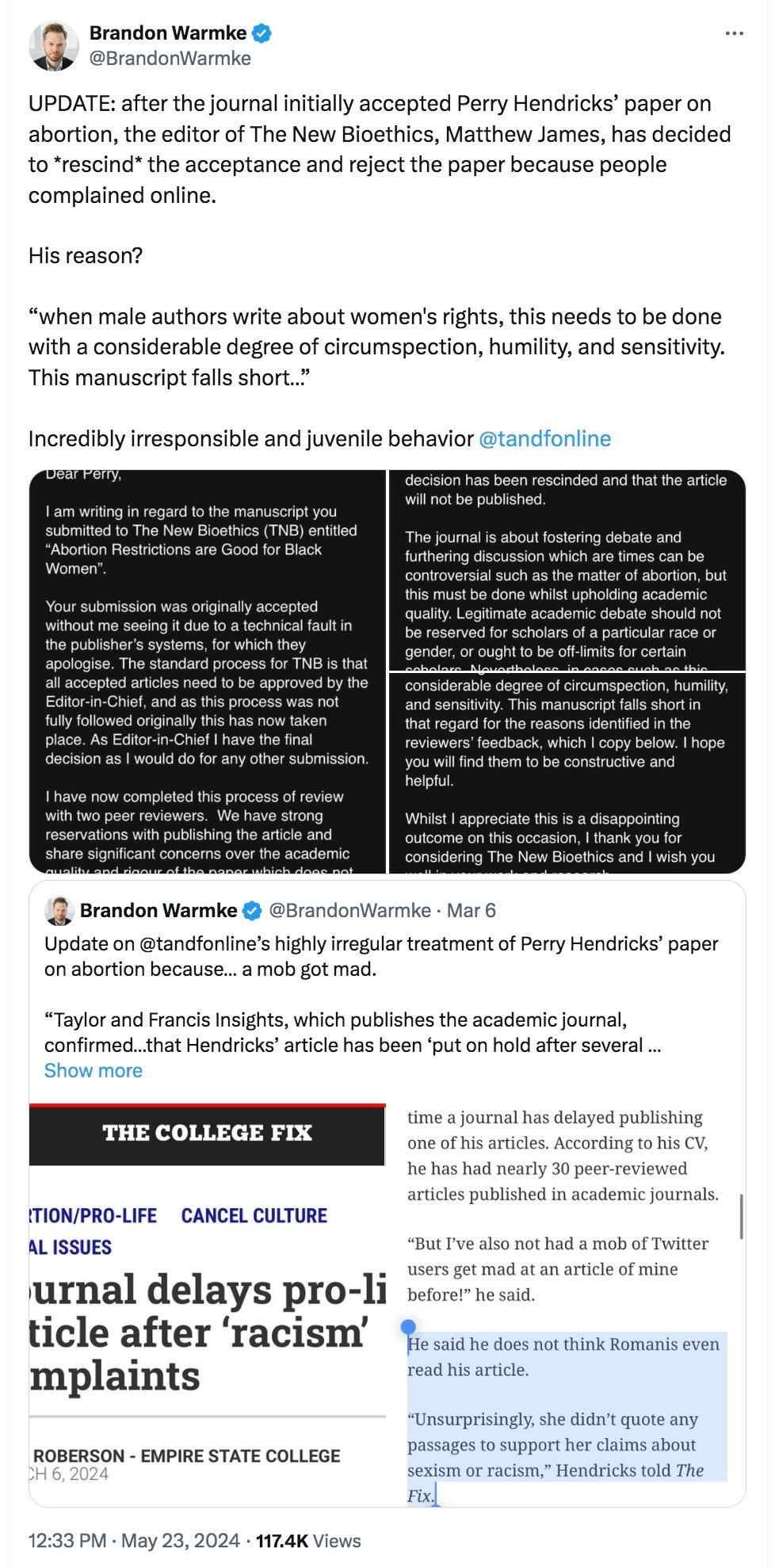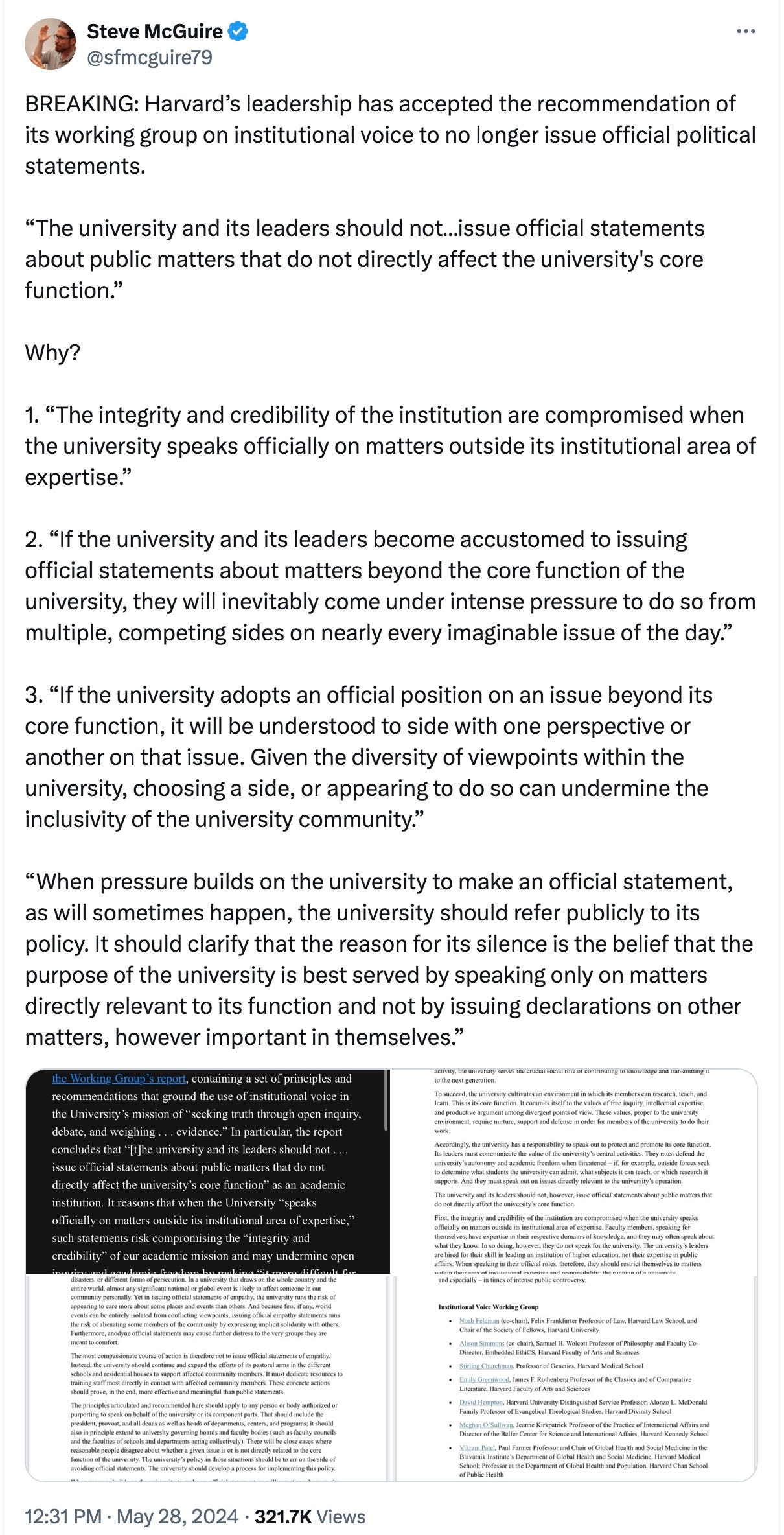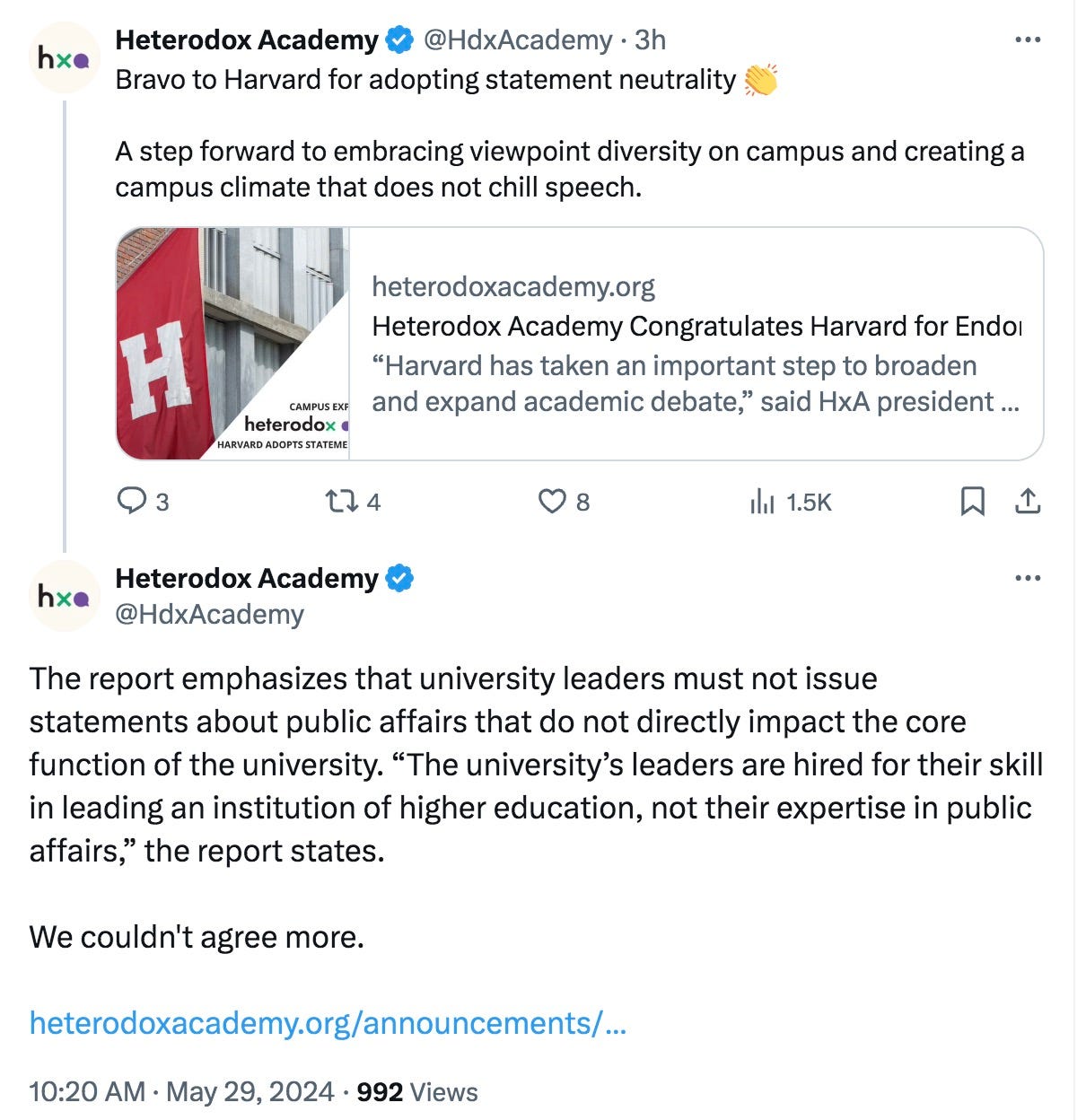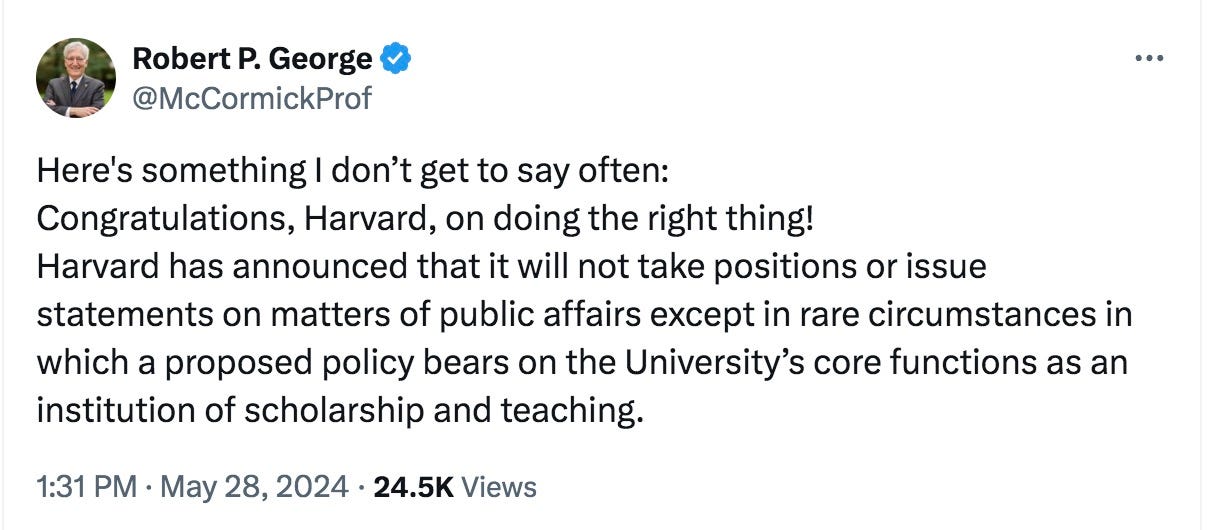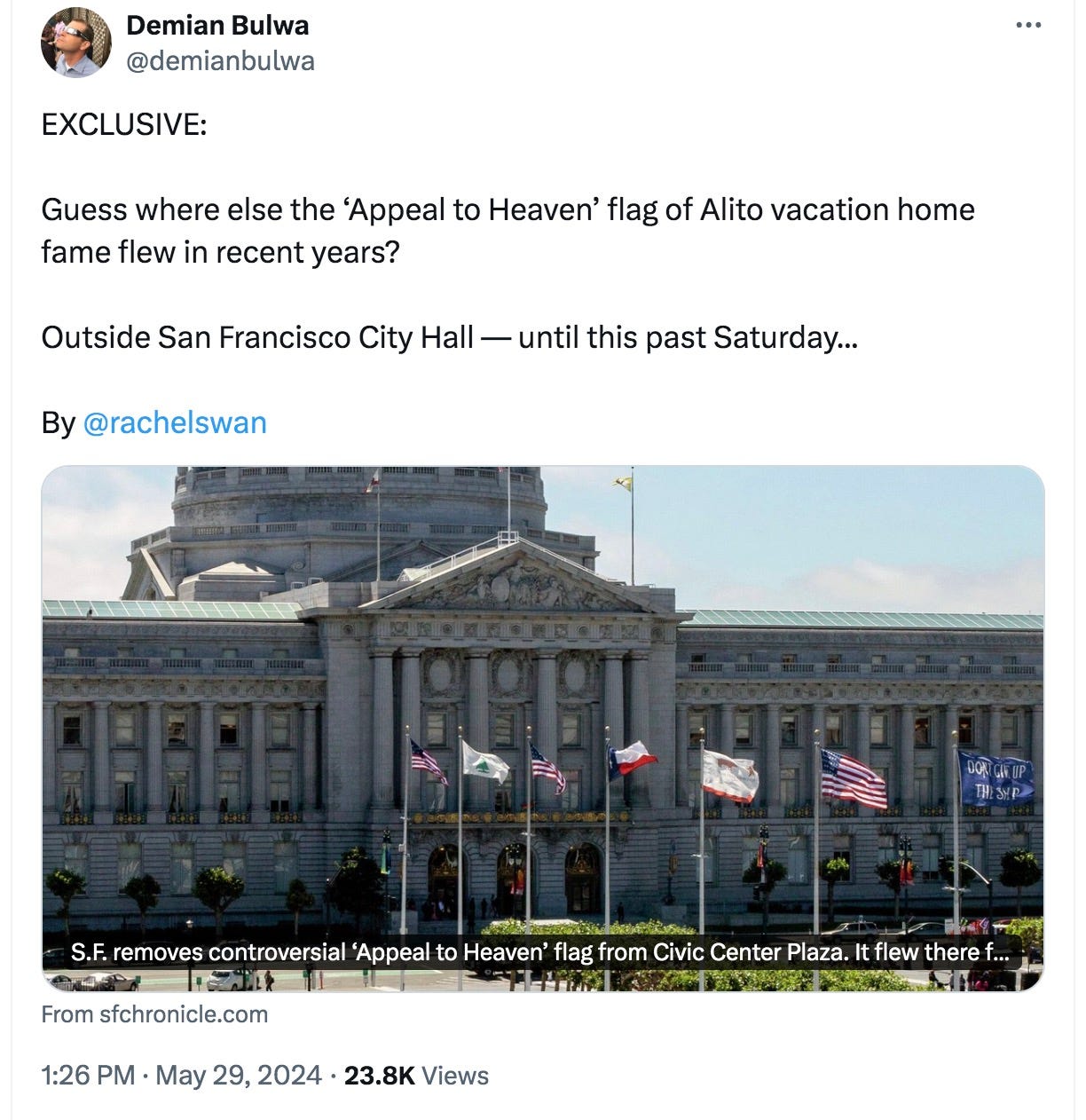E-Pluribus | May 29, 2024
Take this empathy and shove it; a minority report; and the left is rethinking 2024.
A round-up of the latest and best musings on the rise of illiberalism in the public discourse:
Andrey Mir: The Evils of Empathy
At Discourse Magazine, Andrey Mir writes about the dark side of empathy. While empathy is generally looked upon as a positive trait, Mir argues that the flavor of empathy social media tends to propagate is destructive.
Different media provide different levels of empathic involvement with content. Media theorist Marshall McLuhan used the term “empathic involvement” to describe the psychological effect of retribalization in the global village—the world united and agitated by electronic media. Unlike reading, television engages viewers emotionally rather than rationally. It recreates the oral mode of perceiving the world, in which people are immersed in a situation by watching and listening.
It was not a coincidence, for instance, that the Vietnam War ended after the proliferation of television. Vivid images of atrocities fueled the anti-war movement. This did not happen with the somewhat similar war in Korea a decade earlier—TV hadn’t been there yet. Television, with its empathic power ended the era of the imperialist wars, the bloodiest ones in history. There have been no full-scale industrial wars after Vietnam. Instead, the era of “hybrid wars” began. The level of empathy maintained in society by the medium capable of broadcasting “live” pictures has rendered unacceptable the industrial butchering of armies and civilians. Full-scale war is no longer politically or morally accepted. Because of media, wars now try to disguise themselves as various forms of anti-terrorist or military “operations.”
[. . .]
As soon as the media effect of empathic involvement was commodified, it turned into a self-sustaining loop of positive feedback. The more empathic involvement was commercialized, the more it was produced. The commodification of empathic involvement caused “behavior modification”—the term that computer scientist Jaron Lanier suggested to substitute for “advertising.” Society was increasingly trained to be compassionate—by the medium.
[. . .]
The effect was tectonic: Digital media made society even more empathetic than electronic media did. People learned to experience distant news not through detached text, as in the Gutenberg era, but in their personal agenda within their most intimate space of communication—the screens of their personal devices. Zuckerberg is lucky that this statement was attributed to him in the late 2000s, not now, in the early 2020s. With today’s level of mandatory empathy in society, he would have been destroyed for such an allusion.
Whereas television emotionally immersed people in news through watching and listening, social media added talking. The “emancipation of authorship” by the internet made people themselves into media. Now the social media users not only consume empathic involvement—they produce it.
[. . .]
The commodification of affect (by television) and engagement (by digital media) created empathy without unity. It retrieved the emotional involvement that was typical in an oral—tribal—society, but on the technological basis of a new medium that provides distant empathic involvement without any real personal connection and without any physical limitations of space and time. Social media tribes are virtual—most members have never met one another, never really liked one another and never needed to like one another for any practical purposes of interaction. Their fictional need for tribal integrity is induced by the medium that extracts their tribal identities for commodification and makes people think that their identities matter more than their deeds, that their identities are their deeds (as for social media business, they are). Empathy without unity amplifies animosity. People attack one another with their requests for affirmation, causing an empathy race in which empathy gets inevitably weaponized.
Read it all here.
Andrew Sullivan: The Psychology Of Being In A Minority
Joe Biden’s recent address at Morehouse College, a historical college for black men (HBCU), got Andrew Sullivan thinking about the messages being communicated to the various minorities in this country. At The Weekly Dish, Sullivan says intersectionality and hyperbole are leading minorities down the garden path rather than truly empowering them to be masters of their own fates.
The last two Democratic presidents have one thing in common: they have both given commencement speeches at Morehouse College, an HBCU for black men, whose alumni include Martin Luther King Jr. But the two speeches are worlds apart. One reason for this, of course, is that Obama was himself a black man, and so had more leeway to offer some hard truths than Biden did. But even taking that into account, the moderation and uplift of Obama contrast so vividly with Biden’s fatalistic leftism.
[. . .]
Obama calls on the graduates to seize the day, overcome the residual racism in this country, fix their own problems, resist cynicism, and join America’s progress. Biden tells them that all they can do is “bear witness” to the horror of “white supremacy” and fight against “systemic racism.” (And of course the vast, vast majority of black men “killed on the streets” are not killed by cops, as Biden sickeningly implies.)
Leave aside for the moment the question of which president is more accurate in telling America’s racial story — and focus instead on the psychological impact of both messages. Obama evokes personal energy, taking command of your own life, living up to your own responsibilities, acting to make the world better for you and others. Biden’s evokes passivity, helplessness, “bearing witness” to racism, and despair about the eternal nature of America’s racial evil.
[. . .]
This vision of America has been imposed most thoroughly on the generations educated in the last decade, especially since 2020. And we can see the results: a huge increase in depression, anxiety, and mental illness among the young, especially the young women who form the core of the social justice cult. Everyone under 30 is more depressed than in the past, but leftist women, and “non-binary” Americans, are in a class of their own. From Greg Lukianoff’s latest essay:
[. . .]
Wokeness also tells young gays and trans people that they are under “unprecedented attack.” Unprecedented? Seven decades after the Lavender Scare, three decades after the AIDS plague ended, eight years after Obergefell, and three years after Bostock, HRC announced last year: “We have officially declared a state of emergency for LGBTQ+ people in the United States for the first time.” For those of us who lived through AIDS, and won the civil rights we had long wanted, this isn’t just absurd; it’s offensive.
[. . .]
Marinate in the idea that you have no control over anything but resistance to your own eternal oppression and — guess what? — your mental health will understandably suffer. Lukianoff again:
“In practice, intersectionality is a combination of two cognitive distortions: overgeneralizing and blaming. It also arose from a perspective in which the world is utterly dominated by impersonal forces, against which human beings are simply objects that are acted upon rather than people with agency. Within this framework, individuals understandably don’t really feel like they have an internalized locus of control — or an ability to guide the course of their own lives.”
Believing you have agency to change your life — what I always took to be a defining character of American democracy — gives you direction and energy; it allows you to see beyond your own self-pity toward helping others; it helps you moderate the ups and downs of life; it gives you a sense of control over your destiny, things you can do to improve your life.
Read the whole thing.
Brian Beutler: Biden's Critics On The Left Should Rethink The Concept Of 'Leverage'
The Donald Trump era has resulted in a fracturing of conservatives and the right in general, but it has also had an impact on the left. The coming rematch of Trump and Joe Biden has (very) progressive Brian Beutler worried. Beutler writes at his Off Message site that Democrats do not have the luxury of using leverage to shape the 2024 narrative according to their various priorities, but rather need to focus on the big picture: defeating Trump.
In American elections, progressives threatening to withhold their votes for Biden are playing the spoiler just like Manchin—except instead of coming up empty on an infrastructure bill, we’ll get Donald Trump. Some leftists will claim to prefer that outcome and were just waiting for a pretext to oppose Biden. They imagine, wrongly, that they’ll have more clout in the political system if he loses. Others are happy to let Trump burn the whole place down, “after Hitler, our turn”-style. This essay is obviously not for them.
But in unguarded moments, most people on the left will acknowledge that another Trump presidency would be an existential threat to democracy and progressive politics long term. “Leveraging” Biden despite this understanding will sometimes move White House policy, and may thus be a worthwhile, calculated, high-stakes risk in rare circumstances. But it can’t be a permanent condition of coalition-wide politics. If you’ve ever worried that, through serial hostage taking, Republicans will one day blunder the country into default, then you see the problem: Eventually, perhaps just five months from now, the leverage-wielders will hit the brakes too late and drive us off the cliff.
In fairness to the progressives who think this analysis sucks: I agree. Or rather, I agree that the state of affairs sucks.
More representative democratic systems create many more opportunities for factions within coalitions to make demands. In a parliamentary system, progressives could rally to increase the size of progressive parties, and then demand more concessions in power-sharing arrangements when attempting to establish a governing coalition.
In the U.S. system, there is no power-sharing arrangement per se, and the party agenda gets sorted out in the primary. Factions thus have credible leverage during and immediately after primaries. Progressives made solid use of this leverage after Biden beat Bernie Sanders in 2020, as my friends Luppe B. Luppen and Hunter Walker detailed thoroughly in their book The Truce. This year, there was no competitive primary. One of the only viable opportunities progressives ever have to exert leverage thus wasn’t available.
And so they’re left with the nuclear option: The threat to boycott the election and let Trump win. Or, alternatively, the dismaying sense of running out of moves.
The strange thing about it is that activists didn’t reach this bind out of nowhere. Lawmakers and party leaders will frequently tell coalition activists that the pressure is welcome. Together, they propound the myth of FDR telling New Deal activists, “You’ve convinced me. I agree with what you’ve said. Now go out and make me do it.”
Activists will thus convince themselves that certain forms of resistance are constructive when they are not; politicians will reinforce this impression, when for all practical purposes they can’t deliver, and don’t actually find the pressure welcome. Sometimes a convinced president doesn’t have the votes; sometimes a convinced president doesn’t have room to maneuver without fatally dividing his base; sometimes a president is convinced, but cuts a pragmatic deal to ease the politics of an unrelated issue. That’s when activists have to choose between making good on their threats, or standing down. And that’s how a misbegotten understanding of leverage ends in the re-election of Donald Trump.
Read it all.
Around Twitter (X)
Here’s Brandon Warmke with a scientific journal caving to… a social media heckler’s veto! (Link to the original story from The College Fix in March.)
Harvard’s decision we covered yesterday is getting rave reviews:
And finally, there’s that extreme right-wing “provocative” flag again, this time flying outside [checks tweet] San Francisco City Hall?







